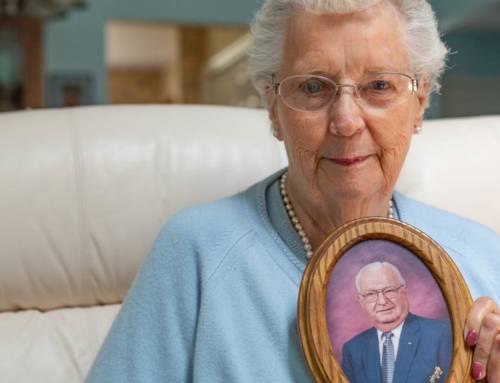
About the Author: Sunday Sermons from Sell Chapel are written by Rev. Preston Van Deursen, Director of Pastoral Care at the Masonic Village at Elizabethtown.
Have you ever said something to somebody that you later regretted? A man named Bob Monkhouse says he got angry at the manager of his local dry cleaners and expressed his anger quite forcefully. He realizes now that he probably did not leave the manager with a very favorable impression.
He knows that because recently he put a red ballpoint pen in the breast pocket of his white shirt and forgot to put the cap on it. It made a ghastly red stain with a dark center all over the pocket. His wife said, “It won’t wash out, I’ll try the dry cleaners.”
So, his wife took the white shirt with the dark red stain on the shirt pocket to the very dry cleaner Bob had exploded at. The manager took a long, slow look at the dark red stain on the front of the shirt and then looked sideways at Bob’s wife and said quietly, “Good shot.”
I would say Bob probably didn’t make a very good impression on that manager. I won’t ask if any of you have ever gotten upset and said anything you should not have said.
Maybe you remember the old story about the guy who got into the bad habit of cursing all the time. Every time he got angry he let out a phrase that he should have kept to himself. After he had let out a tirade in the presence of his young son and his son echoed back some of his choice words, he decided he needed to get rid of this vile habit. He went to his pastor for help.
His pastor said that every time you get angry why not try singing a hymn? That way you won’t express your anger in an inappropriate way. The young father said he would try this, “But,” he said, “I don’t know many hymns.” So the pastor gave him a hymn book to use, and the man took it and tried it.
In a couple of weeks he came back to the pastor. The pastor said, “How are you doing?”
The man said, “I’m doing pretty well.”
The pastor said, “That’s great!”
The man said, “There’s only one thing.”
And the pastor said, “What’s that?”
The man said, “I’m ready for a new hymn book.”
He does have a problem.
In our lesson for the day from Ephesians, St. Paul says, “And do not grieve the Holy Spirit of God, with whom you were sealed for the day of redemption. Get rid of all bitterness, rage and anger, brawling and slander, along with every form of malice.”
What does it mean “to grieve the Holy Spirit of God”? The Holy Spirit is that part of the Godhead that dwells within us. It is the voice of God speaking to us about our ongoing relationship with God, with others and even with ourselves. We grieve the Holy Spirit when we live in a way that is discordant with the kind of person God has called us to be.
It’s challenging to be a new person in Christ Jesus. And particularly when we read the details of the new life that Paul describes about never being angry, or deceitful, or having malice in our hearts, or about never letting any corrupt words escape from our lips, even anger at the manager of the dry cleaners. But Paul, in these last two verses of the fourth chapter, indirectly gives us a little formula that should help.
The first part of that formula is this: look inward. That is, take care of what is inside you. Consider those words again, “Let all bitterness and wrath and anger and clamor and evil speaking be put away from you with all malice.” Do you have any of those negative emotions within your heart or mind? Let’s face it. There are many otherwise committed Christians who have a great deal of anger within them. There are committed Christians who are quite bitter. There are others with malice in their hearts. Paul asks us to look within at any negative emotions that may dwell there.
The late great radio personality Paul Harvey once told about a medical student who was doing a rotation in toxicology at a poison control center. A woman called in very upset because she caught her little daughter eating ants.
The medical student quickly reassured the mother that the ants were not harmful and there would be no need to bring her daughter into the hospital. She calmed down and at the end of the conversation happened to mention that she gave her daughter some ant poison to eat in order to kill the ants.
The medical student told this mother that she better bring her daughter into the emergency room right way.
Anger is like ant poison. It needs to be dealt with immediately or it could cause serious damage to our soul.
Some of the nicest people have a great deal of anger within them. And interestingly enough, it doesn’t always show. Psychiatrists tell us that depression is anger turned inward. Not all depression, of course. Some depression may be explained by chemical imbalances in the body. But for some of us, depression comes from anger which has never been expressed.
There are some people who, when they get angry, just explode, and it is over in a short time. But there are some other people, sometimes very good people, who turn their anger inward. They may not be aware that they are angry because they have suppressed that anger for so long. And then they do not know why they are mournful and weeping all the time. They go to a counselor and the counselor says, “Who is it that you are angry at?”
Paul asked us to look inward and to examine these inner emotions that are a part of being human. For you see, our inner condition determines the way we respond to our lives. It is not what comes to us from the outside that determines our behavior; it is what is already on the inside. As someone has written, “Projection makes perception. The world you see is what you gave it. Nothing more than that. It is the witness to your state of mind. The outside picture of the inward condition. As a man thinketh so does he perceive. Therefore, seek not to change the world but choose to change your mind about the world.”
Take care of what’s inside you. All of us, if we did that, would find some things in our lives, some darkness in our hearts, that we wish were not there. So if we are to live the new life, we are, first of all, to look within.
But fortunately we are not to stop there. The Christian faith is not a mystical faith where we sit around and contemplate our navels. We do begin with an inward glance, but this is only the beginning. St. Paul says take care of the things on the inside.
But then he advises us to look outward. That is, take care of our relationships. “Be kind and compassionate to one another,” he writes, “forgiving each other, just as in Christ God forgave you.”
You see, faith never stops with an inward look, faith always looks outward. “Be kind and compassionate to one another . . .”
Now Christian faith does not consist only of kindness. Kindness is a byproduct of faith in Christ. It is a misconception when people think that Christian faith is simply people being kind to one another. Christian faith has to do with much more than that. But at least it does deal with that. The minimal requirement of Christian faith is that we treat others kindly and with tenderness and with respect. Such kindness is contagious.
There is a wonderful story that comes from the life of the great missionary Albert Schweitzer. A number of years ago on his way to Aspen, Colorado, Schweitzer changed trains in Chicago. As he was standing on the station platform he was being questioned by reporters. A woman carrying a heavy suitcase walked past. Immediately Dr. Schweitzer excused himself. He walked over to the lady, took the heavy suitcase from her and accompanied her to the car of the train she was boarding. Then he turned and walked on back to where the clustered group of reporters had been. They were no longer there. Seeing Albert Schweitzer’s helpfulness, they started looking for some lady with a heavy suitcase whom they might help on to a train, too.
Furthermore, there was a reason Albert Schweitzer helped that lady with the suitcase. He told about it in his autobiography. He said that he and his wife were boarding a train one day in Africa. They had an enormous amount of luggage with them and were having considerable difficulty. A physically handicapped man whom Schweitzer had treated in his mission hospital came forward to help them. He had no baggage, said Schweitzer, because “he possessed nothing.” Schweitzer was greatly moved by the man’s offer, which he accepted. While they walked along side by side in the scorching sun, Schweitzer vowed to himself that in memory of this man’s kindness he would in the future always keep a lookout at stations for heavily laden people, and help them. And this vow, said Schweitzer, he had kept.
Schweitzer added an amusing side note. “On one occasion, however,” he wrote, “my offer made me suspected of thievish intentions!” Can you imagine that? Albert Schweitzer suspected of being a thief!
Sometimes, in this cynical day, when we are trying to be helpful, trying to be kind, we can be suspected of having ulterior motives. But we must make the effort if we are going to live the new life. We can not only be concerned with our inner righteousness but we must also be concerned with our outer witness, the witness of concern for other people. So St. Paul writes, “Be kind and compassionate to one another, forgiving each other, just as in Christ God forgave you.”
And so today we are challenged to look inward, and we are challenged to look outward.
But, of course, that is not the end of the pilgrimage either we are also reminded to look upward. Notice that he says, “Forgiving each other, just as in Christ God forgave you.” This is why we must forgive others, because we have been forgiven. But this is not all. He continues, “Be imitators of God, therefore, as dearly loved children and live a life of love, just as Christ loved us and gave himself up for us as a fragrant offering and sacrifice to God.”
There is the answer to malice and bitterness and anger. There is the answer for making us kind and tenderhearted and forgiving toward one another. We are to imitate God. We are to acknowledge and to remind ourselves of the great love and kindness and mercy and forgiveness we have received from God.
Charles Shedd once applied this to anger. He wrote, “It is no sin to have a temper, only to go on having it, and prayer has helped many to bring a bad temper under control. The best way to lose your temper,” writes Charles Shedd, “is to lose yourself in God.” There is our hope “To lose ourselves in God.” Not only to look inward and outward, but to look upward to God who is the ground of our hope.
Nowhere in the scriptures does it say that this is easy, but it is possible. I don’t know any other way for us to forgive and accept others who have done us wrong than to remember that God has accepted us and forgiven us. The ultimate help for us in meeting the challenges of each day is not only to look inward or outward, but also to look upward.
If we are to live a new life, if we are to be new people, we must be aware of those emotions within us that must be kept under control, we must have our eyes open to the opportunities for service and witness through kindness and tenderheartedness and forgiveness directed toward the people that we meet. But we must also focus our eyes on Him who comes to us with love, forgiveness, and mercy and grace. “Get rid of all bitterness, rage and anger, brawling and slander, along with every form of malice. Be kind and compassionate to one another, forgiving each other, just as in Christ God forgave you. Be imitators of God, therefore, as dearly loved children and live a life of love, just as Christ loved us and gave himself up for us as a fragrant offering and sacrifice to God.”




